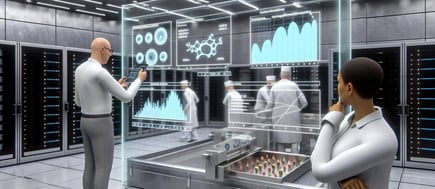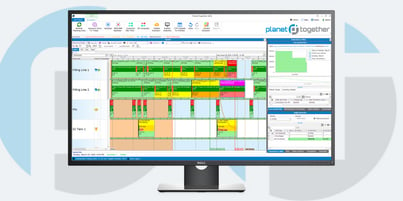Real-Time Data Analytics for Adaptive Production Scheduling and Optimization
In food and beverage manufacturing, where consumer demands constantly evolve, and supply chain complexities abound, staying competitive requires more than just traditional production scheduling methods. Today, success hinges on the ability to adapt quickly, optimize processes efficiently, and make informed decisions in real-time. This is where the integration of advanced technologies like PlanetTogether with ERP, SCM, and MES systems becomes vital.
In this blog, we look into the realm of real-time data analytics for adaptive production scheduling and optimization, exploring how this integration can revolutionize operations for Production Schedulers in food and beverage manufacturing facilities.

Understanding the Challenges
Before we look into solutions, let's address the challenges faced by Production Schedulers in the industry. These challenges include:
- Dynamic Demand: Fluctuating consumer preferences and market trends necessitate agile production scheduling to meet changing demands.
- Complex Supply Chain: Managing a complex web of suppliers, distributors, and retailers while ensuring timely deliveries poses significant challenges.
- Resource Optimization: Maximizing the utilization of resources such as raw materials, labor, and equipment is crucial for operational efficiency.
- Regulatory Compliance: Adhering to stringent food safety regulations and compliance standards adds another layer of complexity to production scheduling.

The Role of Real-Time Data Analytics
Real-time data analytics offers a solution to these challenges by providing actionable insights into various aspects of production scheduling. By harnessing data from disparate sources, including ERP, SCM, MES systems, and external factors like market trends and weather conditions, Production Schedulers can make informed decisions swiftly. Here's how:
- Predictive Analysis: Leveraging historical data and predictive algorithms, real-time analytics can forecast demand patterns, enabling Production Schedulers to proactively adjust production schedules.
- Optimization Algorithms: Advanced optimization algorithms can analyze vast datasets to identify the most efficient production schedules based on factors such as resource availability, lead times, and production constraints.
- Adaptive Planning: Real-time analytics empowers Production Schedulers to adapt plans dynamically in response to unforeseen events such as machine breakdowns, material shortages, or changes in customer orders.
- Continuous Improvement: By analyzing production data in real-time, organizations can identify bottlenecks, inefficiencies, and areas for improvement, driving continuous optimization of production processes.

Integration with PlanetTogether and ERP/SCM/MES Systems
The integration of real-time data analytics platforms like PlanetTogether with ERP, SCM, and MES systems enhances the capabilities of Production Schedulers manifold. Here's how this integration works:
- Seamless Data Exchange: Integration enables seamless exchange of data between PlanetTogether and ERP/SCM/MES systems, ensuring that Production Schedulers have access to up-to-date information from across the organization.
- Unified View of Operations: By consolidating data from disparate sources into a single interface, integration provides Production Schedulers with a unified view of production operations, enabling better decision-making.
- Automated Workflows: Integration allows for the automation of routine tasks such as data entry, scheduling updates, and notifications, freeing up time for Production Schedulers to focus on strategic activities.
- Real-Time Monitoring: Production Schedulers can monitor key performance indicators (KPIs) and production metrics in real-time, enabling them to identify issues early and take corrective actions promptly.
- Scenario Analysis: Integration facilitates scenario analysis by enabling Production Schedulers to simulate different production scenarios and evaluate their impact on key metrics such as cost, lead time, and resource utilization.
In the world of food and beverage manufacturing, the ability to adapt quickly and optimize production processes is critical for success. Real-time data analytics, coupled with the integration of advanced technologies like PlanetTogether with ERP, SCM, and MES systems, empowers Production Schedulers to make informed decisions, optimize resources, and drive continuous improvement.
By harnessing the power of real-time data, organizations can stay ahead of the curve, meet customer demands, and thrive in an increasingly competitive market landscape. Are you ready to take your manufacturing operations to the next level? Contact us today to learn more about how PlanetTogether can help you achieve your goals and drive success in your industry.